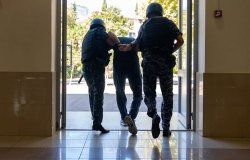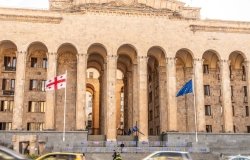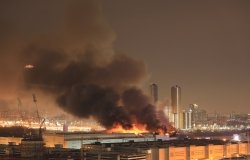My ‘Rosewater’: 105 dark days in an Iranian prison
"On the morning I called my mother from my interrogation session to tell her I was being taken to prison, I urged her to be strong. “You be strong,” she replied," writes Haleh Esfandiari.
I resisted seeing “Rosewater,” the film by Jon Stewart about the ordeal of Iranian-Canadian journalist Maziar Bahari, who was arrested and imprisoned in Iran in 2009. I did not want to relive the horror of my own 105 days in solitary confinement in 2007 in Evin Prison, where Bahari was also held.
I did not want to remember, in the drive up to the prison, suddenly seeing the menacing gray walls of Evin loom up before us. I did not wish to recall the moment when the iron door of my cell clanged shut behind me. Nor did I want to recall the sense of fear, of being utterly alone, that seeps into you and becomes a new layer of skin. In the end, however, I was overcome by curiosity about how Bahari’s experience would be depicted on-screen.
Absurdly, both Bahari and I were accused of threatening the security of Iran. Bahari was accused of spying and seeking to delegitimize the Islamic republic under the cover of being a journalist working for Newsweek magazine. As the head of the Middle East program at the Woodrow Wilson International Center for Scholars, I was told that my work — arranging for scholarly exchanges and discussions of Iranian politics, the economy, and the problems of youth and women — was advancing an American plan to bring about a velvet revolution that would overthrow the Iranian regime. The powerful Iranian government, I had to remind my interrogators, could hardly be crushed by a 67-year-old woman organizing conferences.
“Rosewater” is a dark film. The interrogators are grim, humorless men. Violence, even when not explicit, hovers over the interrogation rooms and the prison corridors. Menace is everywhere. Bahari’s helplessness is palpable.
On the other hand, I missed in “Rosewater” any sense of the rhythm of prison life: the meals; the biweekly visits to the prison doctor; the excitement I experienced at the arrival of new reading material; the interactions with my prison guards. One female guard, about to get married, asked me for exercises to tighten her tummy; another had me translate the instructions on a tube of beauty cream.
The film awakened memories I had long suppressed, stirred up demons I thought I had conquered. It forced me to relive everything: the 6 a.m. wake-up calls; the bell at the entry of the women’s ward, indicating that my interrogator had arrived; the menacing but tedious interrogations, including repetitive questions about trivial matters; the threats of worse things to come.
In the film, Bahari looks stunned when the security men come to his mother’s house to arrest him. I, too, was in shock when, after five months of almost continuous out-of-prison interrogation, my Ministry of Intelligence minder showed me an arrest warrant and took me to Evin. The forlorn look on Bahari’s mother’s face reminded me of the petrified expression on the face of my 93-year-old Austrian-born mother when, early each morning, I would leave the house for another day-long interrogation; she didn’t know whether she would see me again. On the morning I called my mother from my interrogation session to tell her I was being taken to prison, I urged her to be strong. “You be strong,” she replied.
Every prison cell is like another, I thought to myself when I saw Bahari’s cell in the film, although his walls were white, mine gray; his carpet was Persian, mine a tattered wall-to-wall; his cell windowless, mine with two barred windows high up, near the ceiling. The two crumpled blankets on his cell floor reminded me of my first night in Evin, when I slept on the floor on a gray blanket, without a pillow — and of the 104 other nights I slept in much the same way.
Knowing I faced a long ordeal, I imposed on myself a strict discipline of daily exercise in my tiny cell. I recited Persian poetry to myself. Denied pen and paper, in my mind I composed two books: a biography of my grandmother and, for my grandchildren, a children’s story based on Iranian fairy tales. To avoid causing myself pain, I tried hard not to think about my grandchildren and my life outside prison. I drew strength from the conviction that my husband, Shaul, was doing everything in his power to secure my release.
Like Bahari, I had two interrogators: a specialist, who called himself Mr. Ja’fari, and his superior, whom I knew as Hajj Agha. In the film, Bahari’s interrogations are brutal but brief; in reality, they must have been long and tedious. Mine lasted eight and nine hours at a time, sometimes stretching into the evening. On his “good cop” days, Bahari’s junior interrogator would bring him apricots and lettuce wrapped in a Kleenex. I was not even offered a glass of water during interrogations, unless I asked for it. I had a short break only when my interrogators stopped to say their prayers and have lunch. The food was adequate: tea, cheese and bread for breakfast, rice and meat or lentils for lunch and dinner. I ate little; by the end of my ordeal I had lost 20 pounds.
Bahari, blindfolded most of the time in the film, got to see the faces of both his interrogators. I saw my junior interrogator face to face, but I never saw the face of his boss, Hajj Agha. When he was in the room, I had to sit and answer questions facing the wall. I wanted to see his face; I wanted to see whether I could detect any trace of shame or regret for what they were doing to me.
I had to answer all questions in writing. My interrogators delved into the details of my life and my work — from the beginning of my career to the present. They wanted me to say the Wilson Center was in cahoots with the U.S. government to overthrow the Iranian regime. I refused.
While Bahari’s junior interrogator intimidated him by beating him, sticking his face inches from Bahari’s and shouting questions at him, I was never physically abused. My interrogators stayed a respectable distance away, but the psychological intimidation was ever present. I would be put on trial, I was told; there were piles of evidence against me, and I could be held for years. To not be intimidated by such threats was difficult. I was cut off from the outside world. My mother was allowed to visit once near the end of my imprisonment, and my lawyer was not even allowed to see my file or talk to me.
Iran’s Intelligence Ministry agents live in a world in which the CIA, the British MI5, the Israeli Mossad and other intelligence agencies around the world are constantly plotting against Iran and trying to overthrow the regime. They believe that these agencies use journalists, academics and intellectuals to further their schemes, and they view their own compatriots not as men and women who love their country but as unwitting or eager agents for these foreign conspiracies.
In 2009, after the presidential election Bahari was covering for Newsweek, a velvet revolution almost took place. It wasn’t due to any foreign plot but stemmed from millions of Iranians pouring into the streets to protest what they believed had been a rigged election. Marching under the slogan “Where is my vote? ” and sporting the green color adopted by the protest movement, they asked only that their votes be properly counted. The protests shook the regime to its roots — the children of the 1979 revolution, indoctrinated for three decades, had turned against the government, and their numbers on the streets were growing. Security forces went after the protesters with a vengeance. It was coverage of these demonstrations and the clamp-down that followed that led to Bahari’s arrest. The Intelligence Ministry wanted to prove that the uncomplimentary coverage of the protests in the media was part of a plot to undermine the Islamic republic.
When alone in his prison cell, Bahari imagined conversations with his late father and sister, dissidents who had also been imprisoned, and he struggled with whether to give his jailers the “confession” they wanted. I spent my post-interrogation hours carefully going over the sessions in my mind, looking for the traps my interrogators were laying for me and, since I was asked the same questions again and again, making sure I did not contradict or incriminate myself.
The interrogators told me, as they told Bahari, that I had been forgotten, that no one cared about my case. The truth was different. Bahari knew that a campaign on his behalf was underway when a prison guard addressed him, sneeringly, as “Mr. Hillary Clinton.” He realized that Clinton, then secretary of state, had been speaking on his behalf. When his wife, in a brief telephone conversation, confirmed that many were working to get him released, he started dancing in his cell.
I was given similar hope when Mr. Ja’fari asked me, out of the blue: “How do you know Obama?” Barack Obama was then a senator and a presidential candidate. Obama, he told me, had called for my release, and Clinton, then a senator and presidential candidate, had issued a statement in my support. He had thrown me a lifeline, but I dared not tug at it too hard lest it turn into sand in my hands.
For me and for Bahari, release came as abruptly as had our arrests. In both cases, I believe, media coverage and an international uproar played large roles; in my case, a direct intervention with Iran’s supreme leader by former congressman Lee Hamilton, then director of the Wilson Center, also helped. Iran’s Intelligence Ministry achieves nothing with arrests like ours, while they seriously damage Iran’s international reputation. The ministry also has learned nothing; it continues to persecute innocents on fabricated charges, wasting the lives of journalists, academics and dissidents.
The opinions expressed here are solely those of the author.
About the Author


Middle East Program
The Wilson Center’s Middle East Program serves as a crucial resource for the policymaking community and beyond, providing analyses and research that helps inform US foreign policymaking, stimulates public debate, and expands knowledge about issues in the wider Middle East and North Africa (MENA) region. Read more










